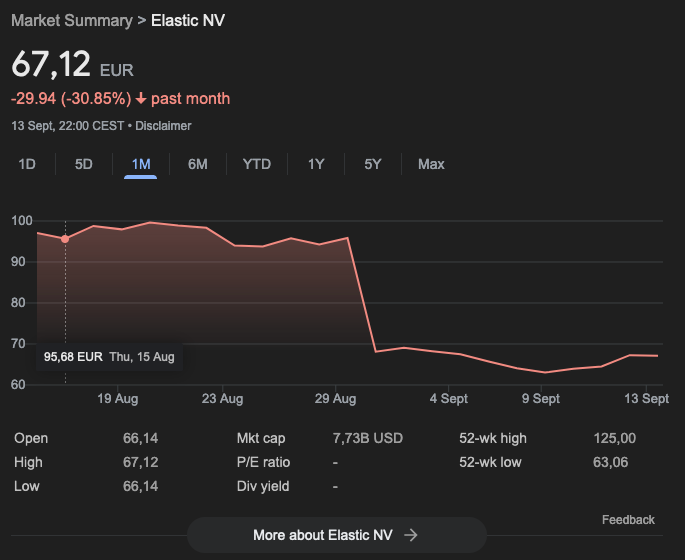Case Study: Elastic's Abandonment of Open Source
Dear Readers,
I have been gathering numerous case studies on open source, and I thought it would be valuable to share these insights with you in my newsletter. In the coming weeks, I'll dive into various examples, exploring how openness influences innovation, collaboration, and growth. Stay tuned for some compelling stories and lessons learned!
Enjoy!
Elastic's Abandonment of Open Source – An Analysis
Introduction: Elastic and Its Rise in the Open Source Community
Founded in 2012, Elastic quickly became a leading platform in search-powered solutions. Its main product, Elasticsearch, was introduced in 2009 as an open-source search engine designed to handle structured and unstructured data. Elastic's success was rooted in its commitment to the open-source community, which provided an innovative, flexible, and community-driven approach to product development. By building an ecosystem around tools like Elasticsearch, Kibana, Logstash, and Beats, collectively known as the ELK Stack (now the Elastic Stack), Elastic fostered a vibrant developer community and secured a foothold in various industries like eCommerce, security, and analytics.
Elastic was well-positioned to capitalize on the changing open-source landscape. The company offered a distributed, scalable search engine that could be used in a wide range of applications, from basic site search to advanced data analytics. Their products allowed companies to use data as a competitive advantage, appealing to a wide audience and generating an enthusiastic developer following. Elastic's success attracted major clients like Cisco, Uber, and Slack, and its community-driven innovation model helped the company achieve rapid growth, culminating in a successful IPO in 2018.
The Strategic Shift: Moving Away from Open Source
Elastic thrived in the open-source community and was celebrated for its transparency and innovation. However, in 2021, the company shifted its strategy, changing the licensing of Elasticsearch from an open-source Apache License 2.0 to the Server Side Public License (SSPL). This move aimed to protect Elastic's commercial interests, particularly against cloud providers like Amazon Web Services (AWS) that offered Elasticsearch as a service.
However, this shift was perceived by many as a betrayal of the open-source ethos, which had been central to Elastic's brand and community. By prioritizing profit over the open-source model, Elastic faced criticism and alienation from its developer base. Competing projects, like Amazon's OpenSearch, emerged to fill the void, offering a fully open-source alternative that quickly gained traction among developers and enterprises.
The Fallout: Erosion of Trust and Financial Implications
The decision to abandon open-source principles had far-reaching consequences. Elastic experienced a decline in community engagement and contributions, a crucial source of product innovation. The erosion of trust and brand reputation significantly impacted Elastic's market position.
In August 2024, Elastic's stock plummeted by 27%, amounting to a $3 billion loss in market value. This was not just a reaction to a poor financial forecast but a symptom of the deeper issue of turning away from the open-source community. While Elastic has recently attempted to reintroduce an open-source licensing option with the GNU Affero General Public License (AGPL), the damage to its reputation and community trust has already been done.

Elastic's story demonstrates the risks of moving away from open-source principles. While short-term profit may seem appealing, the long-term consequences can include a loss of community support, brand erosion, and financial decline. The rise and fall of Elastic highlight the vital role open-source philosophies play in sustaining growth and innovation in the technology sector.
Conclusion
Elastic's journey from an open-source champion to a company grappling with the fallout of restrictive licensing serves as a cautionary tale for businesses. The company's initial success was largely due to its embrace of open-source values, community-driven development, and transparency. However, the decision to prioritize profits over these principles led to a significant loss of trust, market share, and financial stability. For companies considering a similar strategic shift, Elastic's experience underscores the importance of open-source values in fostering innovation, community support, and long-term success.
My comments on the Case Study: Elastic's Abandonment of Open Source – A Broader Perspective on Openness
The situation with Elastic’s move away from open-source principles fits into a larger conversation about the nature and challenges of the "open movement." James Boyle, in his essay responding to "The Paradox of Open," highlights a critical point: openness, whether in the form of open-source software, free speech, or democratic participation, is complex and not without its risks. Boyle argues that while the open movement may not always lead to the idealized outcomes of justice, equality, and truth, the question should be whether open systems are generally more beneficial than closed ones.
Boyle's analogy suggests that even transformative movements like democratization or free speech come with unintended consequences, often exploited by powerful entities. The open-source movement, like the open web, faces similar paradoxes. Elastic’s journey, as outlined in the case study, showcases this paradox: while openness built their community and success, the shift towards a more closed model sparked backlash and distrust.
Yet, Boyle cautions against oversimplifying the issues or assuming that openness itself is flawed because of these outcomes. The real question should be whether openness, despite its challenges, offers a better path than a proprietary, closed-off world. In this light, Elastic's case can serve as a learning point—not as an argument against openness, but as a reminder of the nuanced, ongoing struggle to balance openness with commercial viability in a world of unequal power dynamics.
Thus, the fall of Elastic's stock value following its abandonment of open-source principles serves as a warning, echoing Boyle’s broader critique: while openness may not solve all problems, sacrificing it for short-term profit can lead to long-term repercussions that extend beyond just financial outcomes.
References:
- Elastic's journey and community focus: Elastic Blog
- Industry perspective on open-source evolution: Index Ventures
- Licensing changes and technical details: Wikipedia
